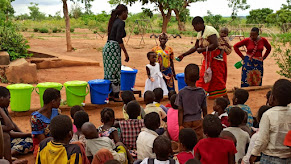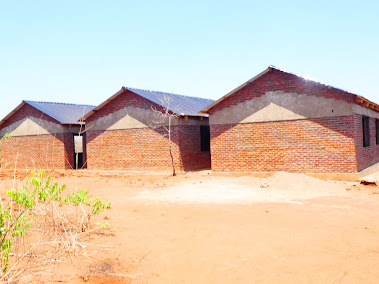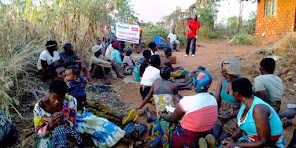CHINANSUNGWI RELIEF HAND ORGANISATION (CHIREHO) BACKGROUND


The photos are showing children in class to the left while to the right children do enjoy out door activities
Under this category, Chinansungwi implemented several activities aimed at assisting pre-school group children in the age range of 3 – 5 years. The children were enrolled targeted in an effort to prepare them for the initial primary school education. In Community Based Child Centres (CBCCs, children were provided with primary school education, indoor /outdoor games and free meals hence most of the children’s parents could not afford to pay in addition to the fact that some of the theses children are orphans. However, parents and all community members contribute in kind through performing some voluntary work in all the Child Care Centers. The voluntary work is ranges from cooking for the children and gardening for growing both food and cash crops. We reach 800 children in the 15 CBCCs

To the Left: Children in one of the classes learning basics, such as counting, alphabet letters and vowels with the assistance of trained teachers as seen on the picture above a teacher standing in front of the children in the class. While to the Right children at one of the CHIREHO’s pre- schools enjoying nutritious meal provided by the government and other non -governmental organizations.
CHIREHO PREGNANT MOTHERS PROGRAMME
Pregnant mothers receive nutritious food from one of the CHIREHO Centers
CHIREHO WATER SANITATION AND HYGIENE (WASH)

The picture to the left above shows the magnitude of the water and sanitation problem the community is facing in the area and as an organization we are thankful to some well wishers like NOVOC and WACRAD who provide a better source of water like the one to the right
 The two pictures above show some of the domestic sources of water and
the duty of the WASHE project is to educate the community on the dangers of
using stagnant and unsafe water.
The two pictures above show some of the domestic sources of water and
the duty of the WASHE project is to educate the community on the dangers of
using stagnant and unsafe water. The organization also educates the community on the methods of how to make water safer such as by boiling it, filtering or chlorinating so that it can be free from germs which causes water borne diseases such as cholera, typhoid, diarrhea, dysentery etc.
WASH PROJECT ACTIVITIES IMPLEMENTED BY CHIREHO


This Chinansungwi Relief Hand Organisation (CHIREHO) water borehole maintenance funded by other donors with the aim of reducing water shortage and water related diseases such as Cholera


To the Left the process of maintaining the borehole continues with the involvement of the community while to the right the process is over and the beneficiaries thanking the donor through the information on the poster shown.
The first picture to the left showing the borehole maintenance work continuing while the one in the Right showing the borehole has now be maintained and the water has started flowing again and the people are enjoying the water at the now maintained and functioning borehole in Chitsonga Village

Leaners of Matindi Community Day Secondary School (CDSS) to the left and Matindi Primary School to the right displaying their posters of thanks to Pollination Project Foundation for maintaining the borehole which is in their campus in Jameson A Village, Traditional Authority Kapeni in Blantyre
ONE OF THE WATER SANITATION AND HYGIENE COMMUNITY TRAINING





The buildings will benefit 150 children from the surrounding villages


After drilling and installing the community was very happy as it is thanking the donor who really came to their rescue
The other borehole was was drilled and installed with the funding from The Nederlands Albert Shweitzer Fonds (NASF) of Netherlands
The community with a poster thanking
The Share Institute for rehabilitating their water borehole through
Chinansungwi Relief Hand Organisation (CHIREHO)
Chinansungwi Relief
Hand Organisation (CHIREHO) secured a funding from the Reece Foundation with the aim of
drilling and installing a water borehole in Mponda and Maulana Villages, Traditional
Authority Kapeni in Blantyre North. The project aimed at achieving the following aims:
The community was very happy and thankful to the Reece Foundation for providing them with clean and safe water, hence free from water related diseases as well as travelling distance fetching for water
CHIREHO Staff having an inspection tour to visit some of the water borehole they drilled and installed in the villages with the support of partners to see if they are really cared for. It was pleasing that the beneficiaries are really taking care of the boreholes.
CHIREHO Staff having an inspection tour to visit some of the water borehole they drilled and installed in the villages with the support of partners to see if they are really cared for. It was pleasing that the beneficiaries are really taking care of the boreholes.
Chinansungwi Relief Hand Organisation (CHIREHO) has established a new
library for its school as well all the surrounding schools in the area. The library
is also for the whole community members in the area. The aim of establishing
this library is to improve and promote education in the area. The photo also
shows one of the CHIREHO staff arranging the books in the new library.
One way of improving nutrition for the children is to provide a fruit, that is why community members together with the staff are planting fruit trees in the school compass to the right as to the left is our dail routine of providing free meals to the OVCs. “ Your child is our child”
The community with a poster in the area of Group Village Nchere thanking The Share Institute for rehabilitating their water borehole through Chinansungwi Relief Hand Organisation (CHIREHO)
The two villages display the posters thanking the Luena Foundation for rehabilitating their water boreholes. To the left is Jamusoni2 while to the right is Kandiwo village.
We attended the capacity building meeting in Tanzania where organisations from several countries met
Combating desertification and other climate change effects Chinansungwi Relief Hand Organisation is initiating the tree planting as one of its projects. This is one of its nurseries established in the community where it implements its project in Blantyre North
CONTACTS
Chinansungwi Relief Hand Organisation (CHIREHO)
P.O.Box 72
Lunzu
Malawi
Email: chinansungwirelief@gmail.com






















































Great blog! LLP registration is a smart choice for businesses looking for limited liability protection with minimal compliance requirements. The flexibility of an LLP, along with benefits like tax advantages and easy transfer of ownership, makes it an ideal structure for startups and professional firms. It’s also great to see the step-by-step breakdown of the registration process. Ensuring proper documentation and compliance with MCA guidelines is crucial. Looking forward to more insights on legal structures and business compliance!
ReplyDelete